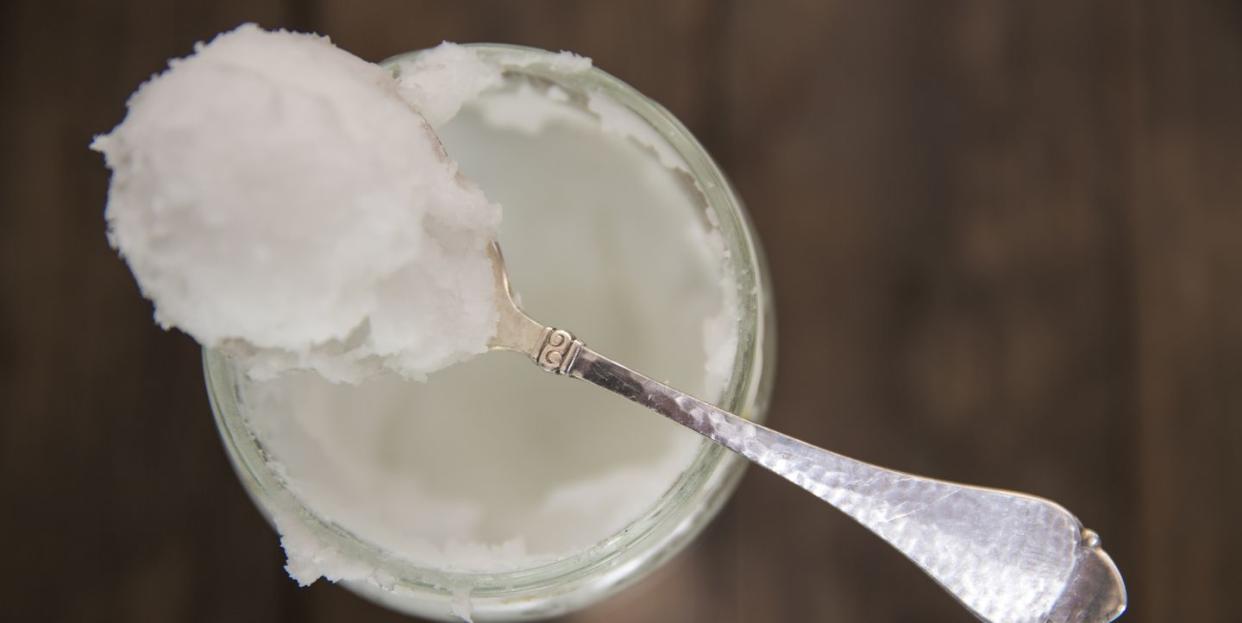So Is Coconut Oil Good for You, or What?

Nutrition trends come and go, but it seems no one can make up their mind about coconut oil.
At one point, nutrition experts advised staying away from the tropical oil because of its high saturated fat content. During the past five years, we’ve seen coconut oil emerge with a health halo as a go-to oil to promote health. People started eating coconut in unlimited amounts, adding the oil to their coffee, baking banana bread with it, and dropping it into smoothies.
Then, a YouTube video by a Harvard professor went viral. In the video, she calls coconut oil “poison,” reports USA Today. “This is one of the worst foods you can eat,” she says. What’s really going on?
What is coconut oil, exactly?
Coconut oil is a tropical oil made from fresh or dried coconut meat. Virgin coconut oil is cold-pressed, which maintains its coconutty taste. Refined coconut oil is stripped of the telltale tropical smell or flavor.
Either way, it’s rich in saturated fat. As much as 90 percent of the fats are saturated, which makes it a higher source than butter or lard, according to the Harvard Health Letter. Per tablespoon, coconut oil has 11 grams of saturated fat. Olive oil, on the other hand, contains less than two grams of sat fat per tablespoon.
Is coconut oil good for you, or is coconut oil bad for you? Here's what the science says
Eating coconut oil makes it easy to accidentally pack in an overload of saturated fat in your diet. “Studies upon studies have shown that the long-term effects of having a diet high in saturated fat is detrimental to your health,” says Tracy Lockwood Beckerman, registered dietitian at TLB Nutrition in New York City. Excess saturated fat raises “bad” LDL cholesterol, which increases risk of heart disease.
Proponents of coconut oil say that its saturated fats are mainly medium chain triglycerides (MCTs). “MCTs tend to be used for energy in the body, with less being stored as fats,” says Alissa Rumsey, MS, RD, creator of the Ditch the Diet Challenge. On the other hand, long-chain fatty acids are the ones that tend to increase unhealthy levels of cholesterol. However, “only about 15 percent of the fat in coconut oil is from true MCTs-so most of the MCTs in coconut oil act just like other saturated fats,” she explained. That means coconut oil isn’t an exception like many believe.
A review published in Nutrition Reviews found that coconut oil raised LDL cholesterol more so than unsaturated plant oils and less than butter. An American Heart Association advisory in 2017 that analyzed more than 100 studies concluded that people should replace saturated fats with polyunsaturated fats to lower heart disease risk.
“Until enough research comes out proving otherwise, I advise my clients to keep all saturated fat intake within the dietary guideline recommendations. That includes red meat, high fat dairy, and yes, coconut oil,” says Charleston-based nutritionist Mia Syn, MS, RD.
You can certainly eat coconut oil, but be mindful of the amount you’re using. “Unlike industrial-made trans fats, which have no safe level of consumption, coconut oil can be incorporated in moderation,” adds Syn. She suggests abiding by the AHA’s recommendation of limiting saturated fat to 5 to 6 percent of daily total calories, which is about 13 grams. One tablespoon of coconut oil has 11 grams.
How to use coconut oil in a healthy way
The news isn’t all bad, though. “No one food will make you unhealthy, just like no one food will make you unhealthy,” says Rumsey. The problem with the viral video demonizing coconut oil is that it inspires food fears and a whole lot of confusion, she says, something that can be a bigger drag on your health than just eating the food in the first place.
If you like the taste of coconut oil, go ahead and incorporate it into your cooking oil rotation. But there’s no reason to only eat coconut oil or avoid it completely. “Vary your sources of fats to widen the variety of nutrients you get,” says Rumsey. You may drizzle olive oil on a salad and pop popcorn in coconut oil, for instance.
Lockwood recommends eating olive oil most of the time because of its makeup of heart-healthy monounsaturated fats, as well as anti-inflammatory antioxidants and immune-enhancing vitamin E. One place you can go ahead and go overboard with coconut oil, though: slathering it from head to toe as a top-notch moisturizer for hair and skin, she says.
('You Might Also Like',)

